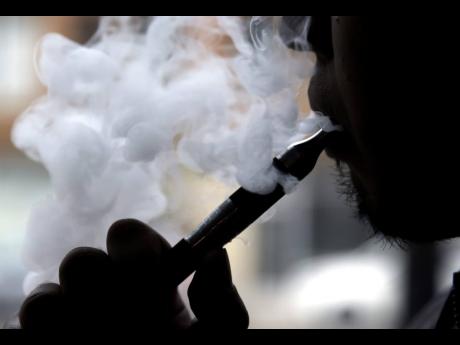Aggrey Irons | Nicotine is not the future, it is a public-health threat
It is with grave concern that the Jamaica Coalition for Tobacco Control noted an article in the Sunday Gleaner of September 17, which quoted the leading tobacco company in Jamaica as saying: “By 2025 we want to be the leader in nicotine. We are now the leaders in tobacco, but now we want to be the total leaders in nicotine.”
The health harms of nicotine are well documented. Vaping is not harmless. What will be the impact of this relatively new “emerging lifestyle shift” on the health of the population; the burden on the health system, given the costs to treat the illnesses associated with the use of these products; the impact on the workforce and consequential impact on national development? What measures are in place or will be put in place to protect the health of Jamaicans, particularly the youth, from these addictive and harmful products?
Nicotine is a dangerous and highly addictive chemical. It can cause an increase in blood pressure, heart rate, flow of blood to the heart, and a narrowing of the arteries. Nicotine may also contribute to the hardening of the arterial walls, which in turn, may lead to a heart attack. This chemical can stay in your body for six to eight hours, depending on how often you smoke. Also, as with most addictive substances, there are some side effects of withdrawal. Some e-cigarettes and newer tobacco products deliver even more nicotine than traditional cigarettes. Once addicted to nicotine use in whatever form, “choice” is no longer an option. The tobacco industry’s mantra of an adult’s right to choose, therefore, rings hollow.
WIDE VARIETY OF PRODUCTS
The term “electronic cigarettes” covers a wide variety of products now on the market, from those that look like cigarettes, pens, or USB drives to somewhat larger products like “personal vaporisers” and “tank systems.” Instead of burning tobacco, e-cigarettes most often use a battery-powered coil to turn a liquid solution into an aerosol that is inhaled by the user. The design of e-cigarette devices has changed since they have been introduced, becoming sleeker and more concealable. The liquid solution used in e-cigarettes typically contains nicotine, propylene glycol, glycerine or some other solvent, and other additives. E-cigarettes and refill liquids or cartridges often contain flavourings, including fruit and candy flavourings that are not permitted in regular cigarettes.
Many e-cigarettes and their refill liquids also come in sweet flavours, such as fruit punch, orange soda, and strawberry, which have long been considered attractive to kids. E-cigarette aerosol is not harmless. It can contain harmful and potentially harmful constituents, including nicotine. The nicotine present in e-cigarette aerosol is absorbed by users and bystanders. Studies have found other chemicals and toxins present in some e-cigarettes, including formaldehyde, acrolein, volatile organic compounds like toluene, tobacco-specific nitrosamines, and metals like nickel and lead.
In consideration of the associated harms, the Tobacco Control Bill, which was tabled on December 1, 2020, makes provision for the regulation of nicotine products. Given the harms, the same treatment accorded for tobacco products are equally stipulated for nicotine products and devices, given the evidence that these products are not harmless.
It is important to note also that these products are currently regulated under the existing Public Health (Tobacco Control) Regulations, which prohibit the smoking/use of a lit or electronic product in the areas where smoking of a tobacco product is prohibited. Similarly, prohibitions related to the sale of tobacco products apply to these nicotine products, including the prohibition of sale to and by minors. Nicotine and vaping products and devices are regarded as gateway products, which, in many instances, allow users, particularly the youth (who are often the target of the marketing campaigns), to transition to the use of cigarette and other harmful substances.
SOBERING
The Jamaican statistics are sobering. The Global Youth Tobacco survey (NCDA, 2017) found that 11.2 per cent of students 13 – 17 years of age currently use cigarettes while 11.7 per cent currently use e-cigarettes. The Jamaica Heath and Lifestyle survey (2017) reported a current adult smoking prevalence of 15 per cent. The World Health Organization reports that tobacco is responsible for 11 per cent of all NCDS compared with three per cent of all communicable disease-related deaths.
This raises questions regarding the enforcement of regulations governing the sale of these products in Jamaica. As we understand it, e-cigarettes and related devices that contain nicotine require a permit from the Ministry of Health for importation, in keeping with the Food and Drugs Act. Given that there is widespread availability of e-cigarettes, it would be instructive to know whether or not all importers have received approval from the MOHW.
The process regarding the finalisation of the Tobacco Control Act (2020), which is currently before a Joint Select Committee of Parliament, needs to be accelerated as the act will go a far way to addressing the health impact of tobacco and nicotine use. In addition to adopting the provisions in the existing regulations, the current bill seeks to ban the advertising, promotion and sponsorship of tobacco and related products such as electronic nicotine delivery systems. The Caribbean states that have banned the importation, distribution, and sale of electronic cigarettes include Antigua & Barbuda and Suriname. In addition to Jamaica ,Barbados, Guyana, and Antigua & Barbuda have banned e-cigarette use in public spaces.
What will be the public-health impact in Jamaica if the aspiration of the tobacco company were to become a reality by 2025? Non-communicable diseases are the leading cause of death in Jamaica, and tobacco use is the leading preventable risk factor. We implore the Joint Select Committee of Parliament to move with haste to finalise the Tobacco Control Act (2020) and thereby protect the Jamaican population, and the youth in particular, from “embarking on a nicotine future”.
Dr Aggrey Irons is consultant psychiatrist and chair of the Jamaica Coalition for Tobacco Control. Send feedback to tcproject@heartfoundationja.org.


